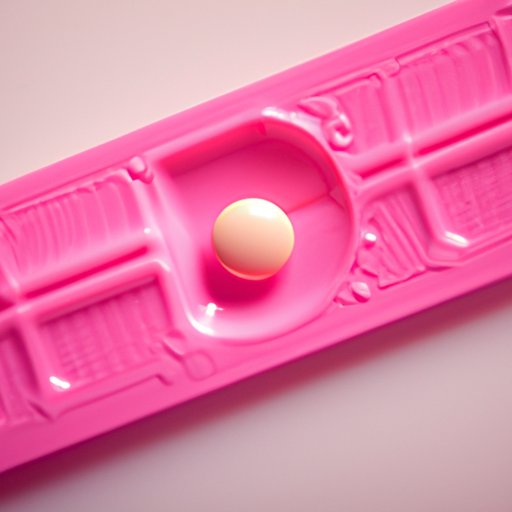
Introduction
When it comes to sex education, there are few topics as misunderstood as menstruation and pregnancy. Many people believe that menstruation automatically prevents pregnancy while others believe that pregnancy can occur at any time during the menstrual cycle. So, can you get pregnant when you’re on your period? This article aims to explore the truth behind the myths, providing in-depth and accurate information on the topic. Our target audience is anyone interested in learning more about their reproductive health, including men and women of all ages who are sexually active.
Exploring Scientific Evidence
To understand the likelihood of pregnancy during menstruation, it’s important to first have a basic understanding of the menstrual cycle. The menstrual cycle typically lasts between 28 and 32 days, and includes several stages: the menstrual phase, the follicular phase, ovulation, and the luteal phase.
In general, the menstrual phase lasts between three to seven days and marks the shedding of the uterine lining. Pregnancy during this time is considered highly unlikely, as the egg has yet to be released from the ovary. However, there are some cases where pregnancy may occur during or immediately after menstruation, such as if there is overlap with the ovulation phase or if sperm remains in the body for several days after sex. Recent studies have also shown that some women may experience ovulation during their menstrual phase, thus increasing the risk of pregnancy during this time.
Despite these findings, it’s still important to take precautions during menstruation, as the likelihood of pregnancy is greatly reduced compared to other phases. Additionally, unprotected sex during this time can still carry potential risks, such as the transmission of sexually transmitted infections.
Debunking Myths
There are many myths surrounding menstruation and pregnancy, including the idea that pregnancy is impossible during this time. However, this is simply not true. While the likelihood of pregnancy is lower during menstruation, it is still possible under certain conditions.
Another common myth is that women are only able to get pregnant during ovulation. However, the truth is that there are several days before and after ovulation where pregnancy can occur, albeit with varying levels of likelihood. It’s important to note that although ovulation typically occurs in the middle of the menstrual cycle, women’s cycles can vary greatly and ovulation can occur at any time.
Finally, there is a belief that women cannot get pregnant if they engage in sexual activity in certain positions or if they douche after intercourse. These myths are simply untrue and can lead to misinformation and unintended pregnancies.
Discussing Contraceptive Options
One way to reduce the risk of unintended pregnancies is by using contraception. There are several contraception options available, including male and female condoms, hormonal birth control pills, patches, implants, and more. It’s important to choose a method that works best for an individual’s specific needs and lifestyle.
Hormonal birth control, which works by preventing ovulation and thickening cervical mucus, can also affect the menstrual cycle. Some women may experience lighter periods or even no periods at all while using hormonal contraceptives such as birth control pills or injections. Additionally, certain forms of hormonal birth control such as the Depo-Provera shot can cause irregular bleeding during the initial months of use.
It’s important to discuss contraceptive options with a healthcare provider to determine the best method for an individual’s specific needs. Contraception not only reduces the risk of unintended pregnancy but can also protect against sexually transmitted infections.
Delving into Fertility
Another important factor to consider when it comes to the risk of pregnancy during menstruation is fertility. Fertility can be influenced by many factors, including age, overall health, and underlying medical conditions.
Women are most fertile in the days leading up to and immediately following ovulation. However, sperm can survive in the body for up to five days, increasing the window for potential pregnancy. Additionally, women with irregular cycles may be more likely to experience ovulation at unexpected times, further increasing the chances of pregnancy during menstruation.
It’s important for individuals to become familiar with their menstrual cycles and fertility in order to make informed decisions about their sexual health. Tracking menstrual cycles using apps or other tools can be helpful in understanding when ovulation is likely to occur. Additionally, couples who are actively trying to conceive may wish to speak to their doctor about fertility testing or other measures that can increase the chances of success.
Sharing Personal Experiences
While everyone’s experiences with menstruation and pregnancy are unique, it can be helpful to hear from others who have gone through similar experiences. Personal anecdotes from individuals who have gotten pregnant or attempted to while menstruating can offer valuable insight into the complexities surrounding this topic.
It’s important to remember, however, that each person’s experience is their own and may not be representative of the general population. Encouraging discussion and sharing of personal experiences can help to reduce stigma and promote a more informed and open conversation around reproductive health.
Conclusion
Overall, the science behind pregnancy during menstruation is complex and multifaceted. While it is less likely to occur during this time, it is still possible under certain conditions. It’s important for individuals to have access to accurate information and to make informed decisions about their sexual health.
By understanding the menstrual cycle, fertility, and contraceptive options, individuals can reduce the risk of unintended pregnancies and protect their reproductive health. By sharing personal experiences and breaking down common myths, we can promote a more informed and open conversation around an often-misunderstood topic.
Interested readers can learn more about this topic from qualified healthcare providers or reputable websites that specialize in sexual health and contraception.





